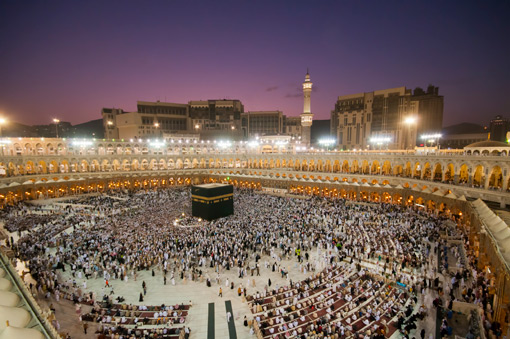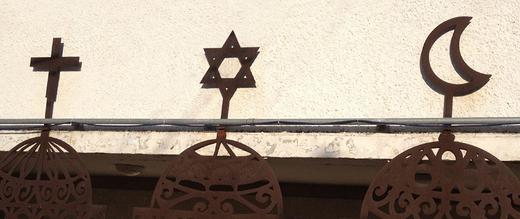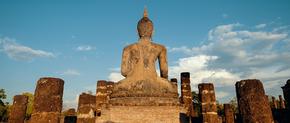The views expressed in our content reflect individual perspectives and do not represent the official views of the Baha'i Faith.
As he spake by the mouth of his holy prophets, which have been since the world began… – Luke 1:70.
We did aforetime send messengers before thee: of them there are some whose story We have related to thee, and some whose story We have not related to thee… – Qur’an, 40:78.
God hath raised up Prophets and revealed Books as numerous as the creatures of the world, and will continue to do so to everlasting. – The Bab, Selections from the Writings of the Bab, p. 125.
In the first six installments of this two-part series of essays, on The Five Ways of Knowing, we explored the classic human methods of recognizing truth. Now, in this continuation of that series, we’ll look at how to apply those methods in making one of the most important truth decisions anyone ever makes in life: how to identify a prophet of God.
The English word prophet comes from the Ancient Greek word prophḗtēs, which means “advocate” or “one who speaks for God.” In both Hebrew and Arabic, the word navi or nabi, which literally means “spokesperson,” traditionally translates as “prophet.” In the Old Testament, God describes a prophet this way: “…and I will put My words in his mouth, and he shall speak unto them all that I shall command him.” – Deuteronomy 18:18. With this description as their guide, the early Jewish teachings said the navi represented the “mouth” or the “voice” of God. The root of the word navi means hollowness or openness. To receive and transmit transcendental wisdom, the ancients believed, a prophet had to provide an open channel, free of self.
Throughout history, humans have followed the Faiths brought to them by the prophets. Every culture and society has felt their profound influence. Whether you call them sages, seers, mystics, teachers, messengers, prophets or manifestations of God, these pure souls bring the word, the voice, the vision and the inspiration of the Creator to humanity. They establish new religions that change the lives of millions upon millions of people. They create moral codes and spiritual laws that last for millennia. They provide us with examples of how to be human, and how to aspire to a higher existence, as well.
Some prophets, their names now lost to us, have brought their messages to indigenous and tribal cultures with no written history. Some messengers inspired peoples so ancient that no records remain of them, their teachings or their societies. Some of these great teachers, however, left a lasting impression by creating entire civilizations and founding Faiths that have endured for thousands of years:
O people! I swear by the one true God! This is the Ocean out of which all seas have proceeded, and with which every one of them will ultimately be united. From Him all the Suns have been generated, and unto Him they will all return. Through His potency the Trees of Divine Revelation have yielded their fruits, every one of which hath been sent down in the form of a Prophet, bearing a Message to God’s creatures in each of the worlds whose number God, alone, in His all-encompassing Knowledge, can reckon. – Baha’u’llah, Gleanings from the Writings of Baha’u’llah, p. 103.
Most people only know about the existence of a few prophets, typically those who started major world religions, touched their own culture or influenced their friends and families. But many, many prophets have spoken to humanity across the span of our long history. The Jewish Talmud specifically names 48 male and seven female prophets, but a Jewish tradition says that throughout time there were twice as many prophets as the number of Jews who were banished from Israel—which would total more than a million prophets. In Christianity, the New Testament names at least a dozen prophets besides John the Baptist and Jesus Christ himself. (Several of these named prophets were women, including Anna and the daughters of Phillip.) In Islam, the Qur’an mentions 25 prophets by name; and an Islamic tradition (hadith) numbers the prophets at 124,000 throughout history. (Islam lists at least one named female prophet: Elizabeth or Alyassabat, the cousin of Mary and the mother of John the Baptist.)
Baha’is also believe that the Creator has blessed humanity with many messengers and prophets:
Baha’u’llah continually urges man to free himself from the superstitions and traditions of the past and become an investigator of reality, for it will then be seen that God has revealed his light many times in order to illumine mankind in the path of evolution, in various countries and through many different prophets, masters and sages. – Abdu’l-Baha, Divine Philosophy, pp. 8-9.
 Without question, though, a few of the prophets have had a major, permanent global influence. Demographers and pollsters estimate that somewhere between 80-90% of the world’s people now follow a Faith originated by one of these eight prophets: Krishna, Abraham, Moses, Buddha, Zoroaster, Christ, Muhammad and Baha’u’llah. Your ancestors probably came from one of these faith traditions—and if they didn’t, they most likely lived in a culture influenced and shaped by an indigenous prophet.
Without question, though, a few of the prophets have had a major, permanent global influence. Demographers and pollsters estimate that somewhere between 80-90% of the world’s people now follow a Faith originated by one of these eight prophets: Krishna, Abraham, Moses, Buddha, Zoroaster, Christ, Muhammad and Baha’u’llah. Your ancestors probably came from one of these faith traditions—and if they didn’t, they most likely lived in a culture influenced and shaped by an indigenous prophet.
The Baha’i Faith–founded through the teachings and the sacrifices of two new prophets, The Bab and Baha’u’llah—is the most recent of those worldwide Faiths. The Bab, whose title means “The Gate” and whose revelation lasted only six years before his death, said that his mission involved preparing the way for a universal messenger of God, in much the same way John the Baptist heralded the coming of Christ. The Faith of Baha’u’llah, whose title means “the Glory of God,” dawned soon after the death of The Bab, and has now expanded to every country on earth and become, after Christianity, the world’s second-most widespread belief system.
In this series of six essays, we’ll examine the prophetic mission of Baha’u’llah, explore the reasons behind the beliefs of the Baha’is who follow this new prophet, and try to determine how to independently evaluate the truth of those beliefs. We’ll focus on these two central questions: What criteria can prove the truth of the claims of a prophet? And how do I respond to those truths if I come to believe them?
Please follow along as we meet Baha’u’llah, try to understand why his followers see and revere him as a prophet of God, and find ways to determine, for ourselves, the truth of his teachings.

















Comments
Sign in or create an account
Continue with Facebookor